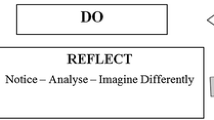Student diversity in classrooms is on the rise and with it, a need for teachers who recognize the needs of diverse student populations. Teacher retention is a national crisis, with teachers of color at especially high risk for leaving the teaching profession early. This case study describes a collaborative mentoring approach used by a primary grades Latina teacher and two university professors. This approach focused on reflective discussion of classroom events and addressed the challenges of teaching for understanding in an age of accountability and changing demographics. Findings indicate that the beginning teacher’s enthusiasm combined with the expertise of teacher educators benefited the teacher, the students, other teachers in the school, and the participating university professors. Implications of this case study point towards the need to mentor diverse educators in the early years.
Similar content being viewed by others
References
Alvino J. (1985). Parents’ guide to raising a gifted child. Boston:Little Brown & Company
Bleach K. (1999). The induction and mentoring of newly qualified teachers: A new deal for teachers. London:Ormond House
Boaler J. (1993). The role of contexts in the mathematics classroom: Do they make mathematics more “real”? For the Learning of Mathematics, 13(2), 12–17
Carver C. L. (2004). A lifeline for new teachers. Educational Leadership, 61(8), 58–61
Chang-Wells, Gen Ling M., & Wells G. (1993). Dynamics of discourse: Literacy and the construction of knowledge. In E. A. Forman, N. Minick, & C. A. Stone (Eds.), Contexts for learning: Sociocultural dynamics in children’s development. (pp. 58–86). New York: Oxford University Press
Cochran-Smith M. (2003). Standing at the crossroads: Multicultural teacher education at the beginning of the 21st century. Multicultural Perspectives, 5(3), 3
Cochran-Smith M. (2006). Stayers, leavers, lovers, and dreamers: Why people teach and why they stay. New York: Bank Street College of Education
Feiman-Nemser S. (1996). Teacher mentoring: A critical review. Washington, DC: ERIC Clearinghouse on Teaching and Teacher Education, AACTE
Freire, P. (1959). Educação e atualidade brasileira. Unpublished doctoral dissertation. Universidade de Recife, Recife, Brazil
Freire P. (1970). Pedagogy of the oppressed. New York: Continuum
Gay G., & Howard T. C. (2000). Multicultural teacher education for the 21st century. Teacher Educator, 36(1), 1–16
Glickman C. D. (1990). Supervision of instruction: A developmental approach. Cambridge, MA: Allyn and Bacon
Hodgkinson H. (2002). Demographics and teacher education: An overview. Journal of Teacher Education, 53(2), 102–105
Hughes, I. (1996). How to keep a research diary. Action Research Electronic Reader. Retrieved August 8, 2006 from http://www.scu.edu.au/schools/gcm/ar/arr/arow/rdiary.html
Ingersoll R. M. (2002). The teacher shortage: A case of wrong diagnosis and wrong prescription. NASSP Bulletin, 86(631), 16
Ingersoll R. M. (2003). The teacher shortage: Myth or reality? Educational Horizons, 81(3), 146–152
Ingersoll R. M., & Smith T. M. (2004). Do teacher induction and mentoring matter? NASSP Bulletin, 88(638), 28–40
Irvine J. J. (1997). Critical knowledge for diverse teachers and learners. Washington DC: American Association of Colleges for Teacher Education
Irvine J. J. (2001). Caring, competent teachers in complex classrooms. Washington, DC: American Association of Colleges of Teacher Education
Johnson S. M. (2004). Schools that support new teachers. In S. M. Johnson (Ed.), Finders and keepers: Helping new teachers survive and thrive in our schools (pp. 91–118). San Francisco, CA: John Wiley & Sons
Johnson S. M., & Birkeland S. E. (2003). The schools that teachers choose. Educational Leadership, 60(8), 20–24
Ladson-Billings G. (1995). Multicultural teacher education: Research, practice, and policy. In C. A. Banks (Ed.), Handbook of research on multicultural education (pp. 747–761). New York: Macmillan
Middleton V. A. (2000). A community of learners. Educational Leadership, 57(8), 51
Monzó L. D., & Rueda R. S. (2001). Professional roles, caring, and scaffolds: Latino teachers’ and paraeducators’ interactions with Latino students. American Journal of Education, 109(4), 438–471
National Center for Education Statistics. (2005a). NAEP 2004 trends in academic progress three decades of student performance in reading and mathematics: Findings in brief (No. NCES 2005463). Washington DC: U. S. Government Printing Office
National Center for Education Statistics. (2005b). The Nation’s report card: Mathematics 2005 (No. NCES 2006453). Washington DC: U. S. Government Printing Office
National Center for Education Statistics. (n.d.). Fast facts. Retrieved October 9, 2006 from http://nces.ed.gov/fastfacts
National Commission on Teaching and America’s Future. (2003). No dream denied, a pledge to America’s children. Washington, DC: National Commission on Teaching and America’s Future
Podsen I., & Denmark V. M. (2000). Coaching & mentoring first-year and student teachers. Larchmont, NY: Eye on Education
Stringer E. T. (1996). Action research: A handbook for practitioners. Thousand Oaks, CA: Sage Publications, Inc
Tharp R. G., & Gallimore R. (1989). Rousing minds to life: Teaching, learning and schooling in social context. New York: Cambridge University Press
Tillman B. A. (2000). Quiet leadership: Informal mentoring of beginning teachers. Momentum, 31(1), 24–26
U. S. Department of Education. New no child left behind flexibility. Retrieved March 21, 2005 from http://www.ed.gov/nclb/methods/teachers/hqtflexibility.html
Udelhofen S., & Larson K. (2003). The mentoring year: A step-by-step program for professional development. Thousand Oaks, CA: Corwin Press
Valenzuela A. (1999). Subtractive schooling: U. S. mexican youth and the politics of caring. New York: SUNY Press
Villani S. (2002). Mentoring programs for new teachers: Models of induction and support. Thousand Oaks, CA: Corwin Press
Villegas A., & Lucas T. (2004). Diversifying the teacher workforce: A retrospective and prospective analysis. In M. Smylie, & D. Miretzky (Eds.), Developing the teacher workforce: The 103rd yearbook of the national society for the study of education (pp. 70–14). Chicago: University of Chicago Press
Vygotsky L. S. (1978). Mind in society: The development of higher psychological processes. Cambridge MA: Harvard University Press
Author information
Authors and Affiliations
Corresponding author
Rights and permissions
About this article
Cite this article
Souto-Manning, M., Dice, J.L. Reflective Teaching in the Early Years: A Case for Mentoring Diverse Educators. Early Childhood Educ J 34, 425–430 (2007). https://doi.org/10.1007/s10643-007-0151-1
Received:
Accepted:
Published:
Issue Date:
DOI: https://doi.org/10.1007/s10643-007-0151-1




